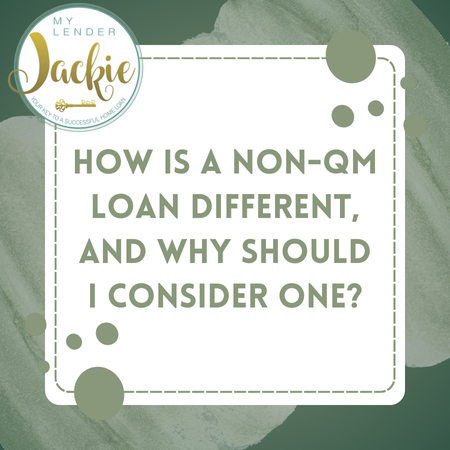If you’ve heard of a non-QM loan but aren’t sure if it’s right for you, then you’ve come to the right place. We have developed an expertise in connecting our clients with the financing that best aligns with their needs and goals. If you’re a successful entrepreneur or self-employed borrower, and you know you’re ready to invest in a home, don’t let concerns about fitting the mold for a traditional mortgage hold you back.
 What is a non-QM mortgage?
What is a non-QM mortgage?
A non-QM mortgage is a type of home loan that doesn’t meet the standard requirements of a qualified mortgage. They are designed give lenders more flexibility in assessing a borrower’s financial situation and ability to repay. While non-QM loans still comply with federal regulations, they allow us to consider alternative income verification methods and offer more tailored financing solutions. Some of our most popular non-QM loans are the self-employed bank statement loan and the cash flow investor loan.
What makes a non-QM mortgage different from a traditional mortgage?
Here are the key differences between non-QM and traditional QM loans:
- Income Verification: A traditional loan application requires W-2s, pay stubs, and tax returns to verify income. With a non-QM loan, we can look at alternative documentation, such as bank statements, profit and loss (P&L) statements, or asset-based income.
- DTI: A traditional loan typically requires a maximum DTI ratio of 43%, but when we are looking at a non-QM loan the DTI requirements can be more flexible depending on other factors. In many cases, our bank statement loans can be approved with a DTI up to 50%.
- Credit Score: Your credit score will still be relevant in your non-QM loan application, but the requirements are more flexible. A traditional loan generally requires a 620 credit score or higher, but a non-QM loan might work with a credit score as low as 580. This is subject to the details of your application, but know that overall there is more flexibility.
- Occupancy Requirements: One reason successful business owners and real estate investors choose a non-QM loan is for the flexible occupancy requirements. A traditional loan is often available only for a primary residents, but non-QM loans have been designed with flexibility in mind, making them perfect for a vacation home or investment property.
Why do people choose a non-QM loan over a conventional one?
In what case would a non-QM loan be the right fit for you? Here are some example scenarios:
- You’re self-employed. If you’re self-employed, a freelancer, or own a business, your income may fluctuate or be difficult to verify using standard documentation. Non-QM loans allow you to use bank statements or P&L statements to demonstrate your ability to repay the loan.
- You want to invest in real estate. Non-QM loans are attractive to real estate investors who may own multiple properties or need a loan for an investment property that doesn’t meet traditional guidelines. These loans offer flexibility for financing rental properties or flip projects.
- You are a non-US resident or a foreign national. Foreign buyers looking to invest in U.S. real estate may not have a U.S. credit history or traditional income documentation. Non-QM loans provide an opportunity to secure financing through alternative verification methods.
- You are asset-rich, but income-light. We know that many savvy, successful people have more resources than are reflected on a W-2. High-net-worth individuals who rely on investments and assets rather than regular income may benefit from asset-based non-QM loans, which consider the value of assets as a means of repayment.
If your financial situation doesn’t align with traditional loan requirements, a non-QM mortgage may be the solution you need to achieve homeownership or expand your real estate portfolio. Ready to find the right financing fit for you? We have years of experience helping our clients successfully secure the mortgage they need to reach their goals in real estate, and we can help you, too. Contact us any time to get started or apply for a loan.

 What is a non-QM mortgage?
What is a non-QM mortgage?